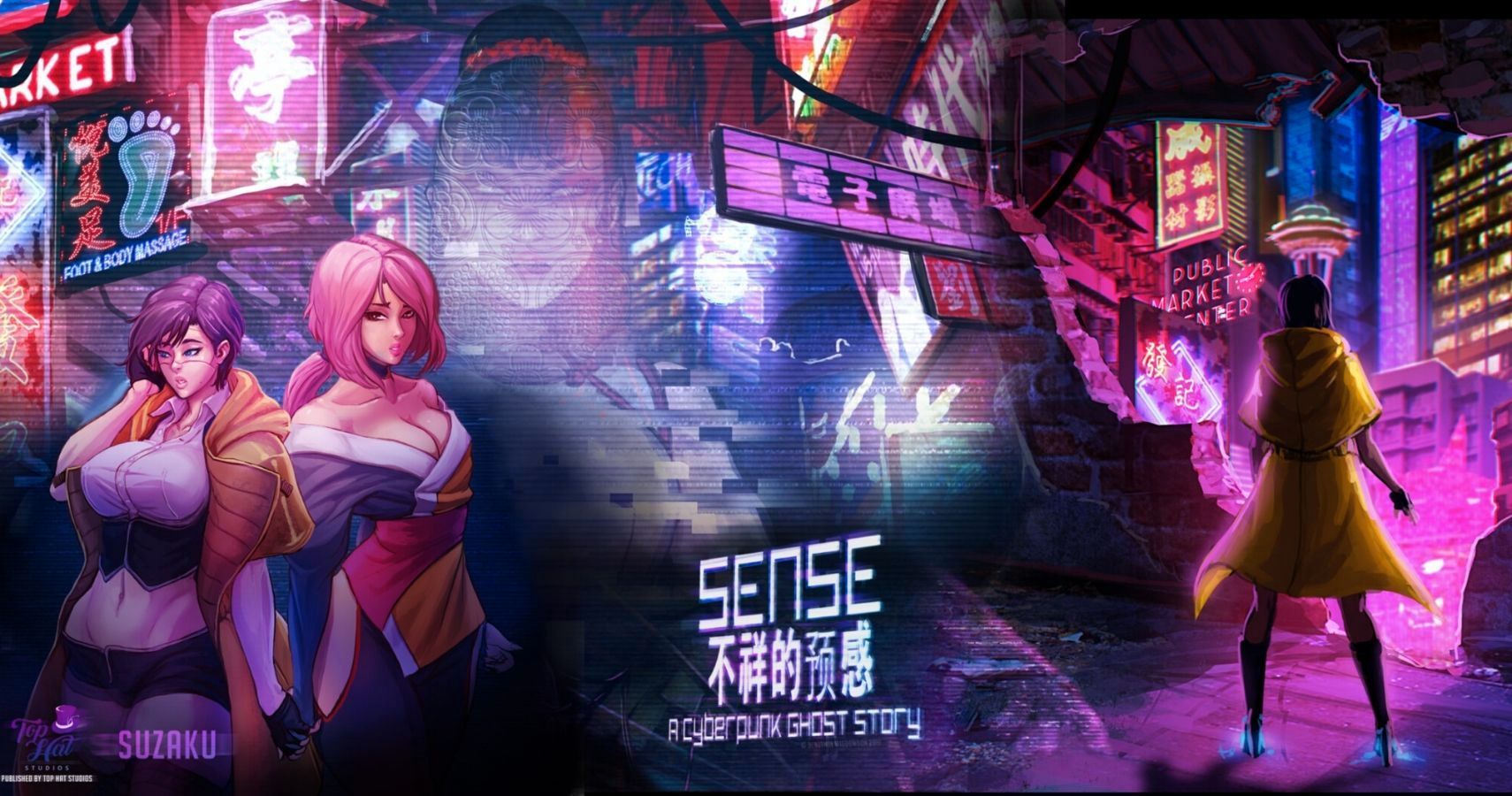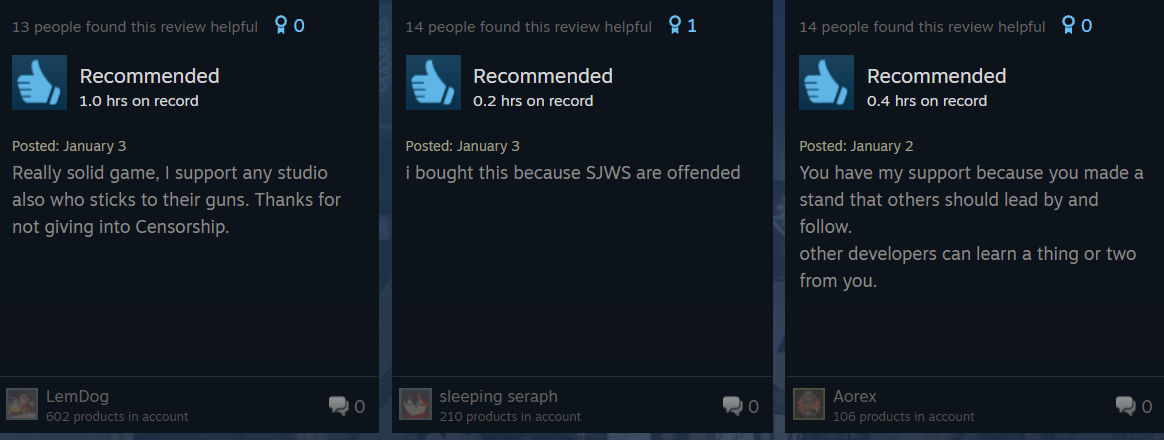On Friday, January 1, Top Hat Studios posted a tweet about Sense: A Cyberpunk Ghost Story that’s since gone viral. Developed by Suzaku and published by Top Hat itself, Sense is a horror game that purportedly combines the cyberpunk genre with traditional Cantonese folklore. It also boasts an aesthetic that has caused quite a bit of a stir over the last few days, instigating discourse about censorship - or a lack thereof.
Essentially, Top Hat has suggested that it received a deluge of requests to censor Sense after it was revealed that it would be coming to Nintendo Switch on January 7. In response, Top Hat said it “will not censor the game because of self-centred crowds who care solely about grandstanding.” You can read the full statement below.
Admittedly, this all reads strangely. A quick Google search will show you that Sense launched for PC back in August 2020, and received in and around 60 reviews over the course of the four months following that. That number has almost tripled since Top Hat published its statement on Friday, which leads to a healthy dose of skepticism as to the veracity of its intentions.
One Steam reviewer notes on January 1 that they bought the game “to reward Top Hat Studio[s] for giving a big middle finger to the SJW cancel mob.” They had 0.4 hours logged at the time of review. Another reviewer admits that they “never would have even given this game a second look” if not for the stir on Twitter, but says they appreciate that “this developer had the balls to stand up to [SJWs] and tell them to shove off instead of cowering and kowtowing to the whims of the fickle and perpetually offended.” This kind of attitude, you might have guessed, represents the bulk of new reviews since January 1.
What’s funny here is that a lot of people don’t even appear to like the game. Prior to the controversy from this weekend, Sense maintained a relatively positive Steam rating, with just a few negative reviews interspersed throughout the overall amount. Now, however, reviews like this one are starting to creep in, which include sentiments like, “I have very little intention of playing this game, it’s just not my thing.” The person who wrote this has logged 0.4 hours and gave Sense a positive review because of, in their words, the “moral clarity and bravery” of Top Hat.
I could go on, but it suffices to say that a large amount of the more recent reviews - which constitute over 60% of the overall amount since August - are just people saying “Fuck SJWs” with 0.1 hours played and an addendum stating that they probably won’t return to Sense. One person even said they were going to buy a new Switch just to purchase another copy of the game. It’s all a bit ludicrous - but then again, it’s not really, because this is how the “anti-SJW” crowd has been once again played by edgy marketing. It’s Hatred all over again.
After Top Hat’s original tweet, some people - myself included - expressed skepticism as to how truthful the statement was. The evidence above discounts any claims of “review-bombing,” given that there are only four reviews on Metacritic and all of them were posted well before any of this even came to light. Steam is where the vast majority of the reviews actually appear, and I went through every single review posted on the platform. From this perspective, Sense looks like another relatively uninteresting game destined to fade into obscurity a few months after launch.
Top Hat has since gone on to collect some of the messages and replies it has received via Twitter and other platforms. The thread is five tweets long, although three of these are just smaller segments of the image included in the parent tweet. You could assume this was done to allow people to see close-ups of the messages, but in reality we all have access to zoom functions and the third tweet, as opposed to the second or fifth, is the new one, which makes it look like more of a bloating technique than anything else. Not that this excuses some of the direct messages portrayed in the screenshots.
The public tweets here are relatively tame for the most part. They’re not really calls for censorship so much as they are expressions of general disapproval towards the game’s stylistic choices, which is something that happens with… every game ever. Also, a lot of them are justified - art styles like this are outdated. That’s not a call for censorship - it’s a fact of style. Is it censorship when the anti-SJW crowd complained that Abby’s arms were too big in The Last of Us Part 2?
The DMs are more damning and I feel for the devs receiving them - there is never an excuse to send death threats to real people, regardless of how you feel about them. I’m all for criticism of a text, but you don’t take it to an individual level and make it about a real human being. That’s the lowest of the low.
It’s important to note that while I am sympathetic to the devs receiving horrible messages, the rest of Top Hat’s statement provides no evidence for its claims. From what I can see, there has been no review-bombing and no mass cries for censorship. The parts of the statement that quote criticisms against the game represent things that very few people actually said, but they have been sensationalised to make the game appear as some kind of anti-censorship, anti-SJW product that is enticing for the same kind of people who abused others about Cyberpunk 2077 before even playing it.
The biggest proof of this is that Sense had already gotten past its platform tests. There’s no need to discuss censorship unless you want to trigger a marketing campaign. There is no pressure to change the game from anyone outside of a small demographic that won’t play it anyway - so why amplify it and say “The game will not be censored. We categorically refuse”?
Ultimately, this reads as a call to arms. It’s pandering to people who will do exactly what this article has highlighted - buy a game they have zero to no interest in to support a self-righteous ideological cause that doesn’t exist outside of their own heads. Criticizing a game for its art style isn’t censorship - it’s criticism! On the contrary, lambasting criticism and attempting to snuff it out with overblown marketing ploys designed to sell copies of an upcoming Switch port for a quickly-forgotten game is far closer to the kind of censorship it proclaims to be rebelling against, if only because it is censoring meaning by intentionally manipulating truth. If Nintendo asked for Sense to be censored, you can guarantee it would have been. But Nintendo didn’t ask for it to be censored, and virtually nobody else did either. The only parties talking about censorship are Top Hat and the people it has riled up to buy a game that nobody, on either side, really cares about.


